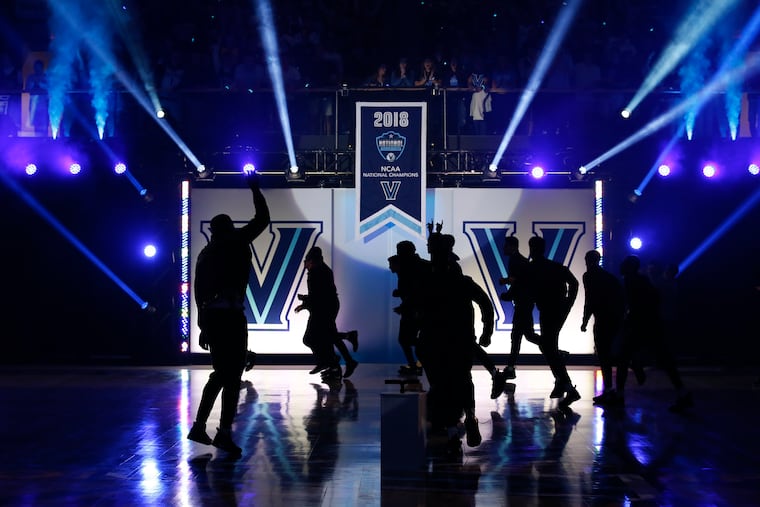We asked Tobias Harris and other insiders: Should Pa. legalize paying student-athletes? | Opinion
Known as the Fair Pay to Play act, the law is in direct conflict of strict NCAA rules that have prohibited student-athletes to be compensated.

On Monday, California Gov. Gavin Newsom signed into law a bill that would allow collegiate athletes in California to profit off their names, likenesses, images, and endorsement deals. Known as the Fair Pay to Play Act, the law is in direct conflict of strict NCAA rules that have prohibited student-athletes to be compensated. In the days that followed, lawmakers in several other states, including Pennsylvania, signaled their desire to pass their own Fair Pay to Play Acts.
Should Pennsylvania pass legislation similar to California’s? The Inquirer asked local stakeholders to weigh in.
The Student-Athlete
The USC bookstore sells a known player’s jersey and everyone buys it. The school profits from that, but right now, the player doesn’t, even though it’s his image and likeness. If an athlete’s face or number is being used to advertise the team and university, I believe that student-athlete should be paid for that. When you’re on that pedestal, you have to maintain. It’s not just the pressure you put on yourself, it’s the pressure that the team and the school puts on you. The expectations that people have of you are really high. Being a student-athlete is a full-time job and can sometimes turn into being an athlete-student. If California makes it a law that some student-athletes can get paid, all the other states should go ahead and do the same.
The Sports Agent
Many athletes who play collegiate sports come from impoverished backgrounds and have little means to provide for themselves while in college. Often this can lead to the athlete gaining employment while trying to balance the rigors of college and the demands of football or falling prey to dirty agents who seek to create dependency by providing gifts, including money, to athletes in exchange for a future commitment to work together. These gifts, known as inducements, are prohibited and can jeopardize the athletes’ collegiate and potential professional athletic career. Legalizing financial compensation for collegiate athletes could curtail illegal inducements and alleviate the stress of having to seek employment. Pennsylvania, and other states, should consider legislation to do this.
The Professional Athlete
I do believe that college athletes should be getting paid. I’ve believed that for some years now. Now you are seeing a lot of it get exposed in the media and catch light. The excuse of giving them an academic scholarship? No, I’m not rolling with that one. The NCAA corporation makes billions of dollars off these young men playing. They deserve to be paid, and they deserve to get their check.
The Coach
College athletes should have the same rights to work or become an entrepreneur as we encourage every other student to do. The athletes in my classroom should not be treated differently than other student. Pennsylvania colleges and universities need to compete for the very best students while keeping in mind the important issue of student debt. Not all college athletes are on a fully funded scholarship. In fact, the vast majority are not. They should not graduate with more debt because of an artificial barrier that prohibits them from effectively managing it while in college. — Karen Weaver, an associate clinical professor at Drexel University. She spent 14 years in the Big Ten Conference as a head coach and athletics administrator.
The Lawmaker
College sports is a multibillion-dollar industry that has grown to support massive stadiums and earn lucrative broadcast and licensing deals that enable it to pay many coaches over seven figures annually, while at the same time restricting the economic freedom and opportunity of the athletes whose hard work makes the sports so attractive and popular. For most of these athletes, their collegiate sports experience will be the zenith of their athletic career. For a few it can serve as the launching pad into greater opportunity. But we currently allow 19-year-old musicians to enter into any contract they wish as far as representation, sponsorships, and endorsements, but would prohibit those same adults from entering into similar contracts simply because they had the audacity to play college sports. And while scholarships may provide some assistance to people who may not have been able to afford today’s high-cost colleges, they do little to excuse such restrictions on otherwise constitutionally protected rights for adults to enter into contracts they deem beneficial to them.
The Professor
The business model of collegiate athletics creates a troublesome conflict, and the law may actually exacerbate the problem. The Fair Pay to Play Act allows students to receive compensation for their likeness, but not directly from colleges and universities — and that is its biggest flaw. The time and energy required to make that money will only further pull student-athletes away from their academics. Make no mistake: These athletes should be compensated. For some it’s an economic necessity. But research clearly shows that having to earn money through heavy promotional activity, without the involvement and support of their institution, will present an academic burden that many student-athletes simply can’t overcome.